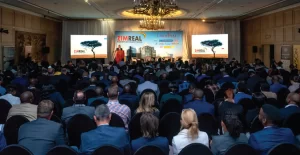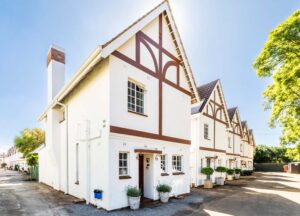Organised by API Events the second ZimReal Property Investment Forum took place on 17th July at Meikles Hotel in Harare. Similar forums are held across Africa including the East Africa Property Investment Summit in Nairobi, the West Africa Property Investment Summit in Lagos, the FrancoReal Property Investment Forum in Dakar, ZamReal held in Lusaka, BotsReal in Gaborone, MozReal in Maputo and their flagship event, the African Property Investment Summit to be held at the Sandton Centre, Johannesburg on 2nd and 3rd October.
The ZimReal Property Investment Forum brings together local and international investors and developers in the real estate sector which is one of the main drivers of the Zimbabwean economy. Currently the forum is the only platform focused on the built environment and the challenges and opportunities faced in our local market, from infrastructure redevelopment to macroeconomics, asset preservation, sustainability, hospitality, Proptech and more.
It aims to help Zimbabwe rebuild and modernise its economy by providing solutions for new growth in the current difficult environment. Sectors under discussion included:
- How are landlords protecting their hard[1]currency property investments?
- What strategies and plans are developers implementing around rental reviews and lease negotiations?
- How have asset values changed or fluctuated after the recent currency announcements?
- Uncovering New Growth nodes: Developments in – Marondera, Bulawayo, Victoria Falls and opportunities on outskirts of Harare such as new the parliament development plans.
- Investment Case for New Sectors: Logistics and warehousing, student accommodation and more.
- Impact of new infrastructure projects on the real estate industry.
- Introduction and impact of new real estate technology and building innovations for Zimbabwe’s built environment. 8. Reviewing current retail strategies and tenant lease negotiations. How has the market shifted over the last 12-months?
- Shared workspace- who is leading the way and future trends for Zimbabwe.
- Public Sector influence on the built environment: PPP’s, Finances, FX and more. The event was scheduled to open with an address by the Ministry of Local Government, Public Works and National Housing but unfortunately the representative was unable to attend. Instead the discussions were opened by Tara O’Connor, Executive Director, Africa Risk Consulting, who looked at how the current political situation is adversely affecting the economic challenges facing Zimbabwe.
Other presentations of interest to developers were: A look at Zimbabwe Student Housing presented by Stephen Kapfunde from Zimre Property Investments. Zimre is one of the leaders in property sales, management, valuation and development in Zimbabwe. The company has recently dis-invested in office space in the Central Business District of Harare siting falling returns on rentals. They have ventured into new territory by refurbishing its Nicoz Building in Bulawayo into off campus student housing. This is in line with world-wide trends which foresee vast potential for growth in the area of accommodation for tertiary, post-graduate and research students. The facility caters for up to 200 students and amenities include self-contained rooms with kitchenettes and bathrooms, laundry facilities, access to Wi-Fi and good security.
Zimre Property Investments are seeking to take advantage of the ever increasing number of students enrolled at tertiary institutions as well as attracting international students. Gibson Mapfidza from Mashonaland Holdings presented a paper on The Impact of New Infrastructure Projects on the Real Estate Market. Mashonaland Holdings fully endorses the view that Bulk Infrastructure is vital to Responsible Property Investment (RPI). Property values increase directly in accordance with the accessibility of basic services like electricity and water supply, sewer systems, good road and transport networks, the supply of emergency services (like ambulances and fire fighting services), and the accessibility of communication and technology networks.
As our cities continue to grow the demand for basic infrastructure increases. Harare in particular has seen the rapid expansion of informal settlements which lack even the most basic infrastructure and existing infrastructure is collapsing due to a lack of maintenance and the failure to develop new facilities to meet demands. Local government appears to lack both the will and the finances to cope with the increasing burden.
This leaves the responsibility squarely on the shoulders of PPPs (Public Private Partnerships) and PFIs (Private Finance Initiatives). PPP and PFI investment can see profitable returns as well as stimulating economic growth but there needs to be a major shift in policy and legal frameworks to make investments more attractive. Mr Mapfidza quoted ARUP as saying, “Basic infrastructure is …not a luxury that can wait for better economic times, but a precondition for supporting and creating them.”
Stuart van de Ruit, director of the Steel Building Company, gave the Steel Building Construction presentation. (The Steel Building Company incorporates Agristructures and Superstructures.) The presentation covered recently completed projects in Zimbabwe, Zambia and Mozambique. Steel structures have the advantage of being versatile, affordable and quick to erect. In addition steel structures are robust enough to withstand extreme weather conditions like the recent Cyclone Idai and durable enough to require little maintenance.
Typical applications include complete mine premises solutions, including warehousing; workshops for plant, machinery, welding and vehicles; laboratories; shift change rooms; administrative blocks; machine shops; electrical workshops; material bulk storage; plant crane gantries; conveyor frames and roofs. Industrial solutions include factories and warehousing with the advantage of massive roof spans that create totally open usable floor space. The steel construction process is ideal for large shopping malls as well as for smaller applications like housing, classrooms and modular buildings.
Other interesting topics covered included an update on the hospitality and tourism industry, the potential for development of new Growth Nodes, landlord and tenant negotiations in this time of currency instability and a comparison with the real estate business in neighbouring South Africa. The ZimReal Property Development Forum is a great opportunity to get up to date, relevant information and opinions and network with other players in the property market.
words: Michael Nott
photos: by API Events









